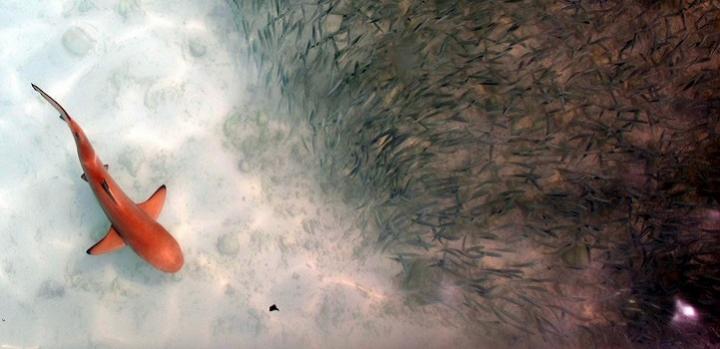
Credit: © 2019 Claudia Pogoreutz
A survey of the shark skin microbiome provides the first step toward understanding the remarkable resilience of shark wounds to infection.
In the wild, blacktip reef sharks are often seen bearing wounds, but they rarely exhibit obvious signs of infection around the wounds. As a first step toward understanding this phenomenon, an international team led by researchers at KAUST’s Red Sea Research Center investigated the microbial community living on the skin of sharks.
The team collected skin mucus samples from the backs and gills of wild-caught blacktip reef sharks around the Seychelles Islands. Next, they sequenced the 16S rRNA gene from these samples in order to identify the bacteria. Finally, they compared the bacterial communities from different samples to detect changes in response to injury.
The team’s analysis revealed no difference between the bacterial communities on injured skin on gills and uninjured gills or backs. In other words, there was no evidence of infection around the wounds. “We were surprised not to find any substantial change in the skin bacterial communities,” says Claudia Pogoreutz, the postdoctoral fellow who led the study.
“This suggests shark skin doesn’t become infected easily and that the native bacterial community of the skin can be maintained even after injury,” she adds. “We really need to delve deeper into bacterial functions and innate immunity of sharks to understand what is really going on and how wound healing in sharks is mediated.”
However, the team did find differences in the bacterial communities collected from the skin of sharks at different locations. Although the sites were just a few kilometers apart, they could be relatively isolated from each other by factors, such as ocean currents and the reluctance of blacktip reef sharks to move between habitats or cross deeper straits. The differences in shark skin microbial communities may reflect differences in the ambient environment, such as temperature, population density, nutrient availability or pollution, but researchers cannot rule out the possibility that the changes could provide an adaptive benefit to the sharks.
Based on their findings, the team identified a core skin microbiome that is conserved across blacktip reef sharks, alongside site-specific differences. They also found no changes in the microbiome around wounds, suggesting that they don’t get infected or that any infections are too mild to detect.
Plenty of questions remain: from understanding the regional differences to figuring out if and how the microbiome contributes to wound healing and infection resistance. “There’s still so much to learn with respect to shark skin-associated bacteria,” says Pogoreutz.
###
Media Contact
Carolyn Unck
[email protected]
966-054-470-0408
Original Source
https:/
Related Journal Article
http://dx.




